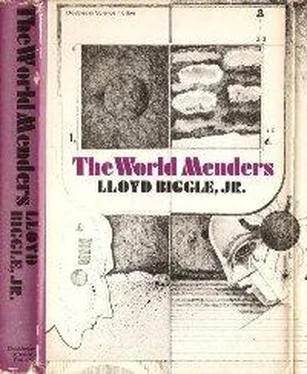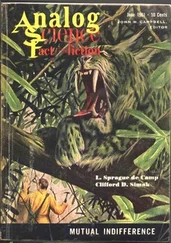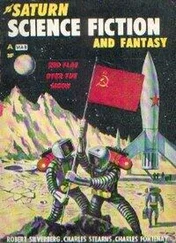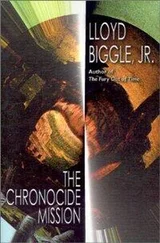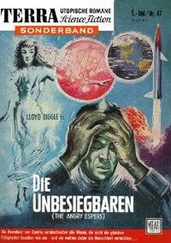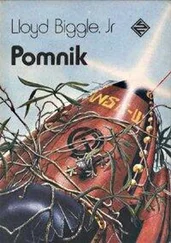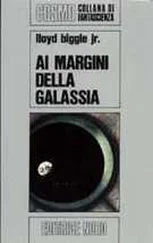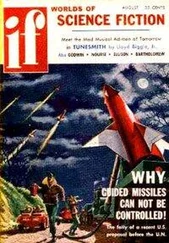Lloyd Biggle Jr. - The World Menders
Здесь есть возможность читать онлайн «Lloyd Biggle Jr. - The World Menders» весь текст электронной книги совершенно бесплатно (целиком полную версию без сокращений). В некоторых случаях можно слушать аудио, скачать через торрент в формате fb2 и присутствует краткое содержание. Год выпуска: 1971, Издательство: Doubleday, Жанр: Фантастика и фэнтези, на английском языке. Описание произведения, (предисловие) а так же отзывы посетителей доступны на портале библиотеки ЛибКат.
- Название:The World Menders
- Автор:
- Издательство:Doubleday
- Жанр:
- Год:1971
- ISBN:нет данных
- Рейтинг книги:5 / 5. Голосов: 1
-
Избранное:Добавить в избранное
- Отзывы:
-
Ваша оценка:
- 100
- 1
- 2
- 3
- 4
- 5
The World Menders: краткое содержание, описание и аннотация
Предлагаем к чтению аннотацию, описание, краткое содержание или предисловие (зависит от того, что написал сам автор книги «The World Menders»). Если вы не нашли необходимую информацию о книге — напишите в комментариях, мы постараемся отыскать её.
The World Menders — читать онлайн бесплатно полную книгу (весь текст) целиком
Ниже представлен текст книги, разбитый по страницам. Система сохранения места последней прочитанной страницы, позволяет с удобством читать онлайн бесплатно книгу «The World Menders», без необходимости каждый раз заново искать на чём Вы остановились. Поставьте закладку, и сможете в любой момент перейти на страницу, на которой закончили чтение.
Интервал:
Закладка:
Farrari departed disgustedly, had his dinner in his quarters, and went to bed. He was a long time falling asleep, but he awoke suddenly with a firm hand shaking him. Against the subdued ceiling glow he made out the shadowy figure of a man bent over him. Peter Jorrul’s voice said, “I’m taking you to Scorv. How much time do you need to get your kit together?”
Farrari sat up and muttered sleepily, “What’s that?”
“Get ready as quickly as you can. We’re waiting for you—meet me at the hangar.” He hurried away.
Farrari splashed water into his face and shook himself awake. He doubted that he’d heard Jorrul correctly, but he pulled on clothing and hurried to the hangar.
Workmen were packing supplies onto a large flying platform. Jorrul stood nearby, talking with Isa Graan. He wore native dress similar to what he’d worn on the night of Farrari’s arrival, and he carried a heavy cloak over his arm.
He glanced at Farrari and scowled. “Where’s your kit?”
“Kit?” Farrari echoed bewilderedly.
“Equipment. Tools. Whatever CS people work with.”
Graan chuckled. “He carries all of it in his head. CS people don’t work with things. They work on things.”
Jorrul stalked away. Graan said, “You’re the first specialist he’s ever taken into the field who didn’t insist on lugging half the base with him.” He studied Farrari critically. “You’ll need a cloak.”
“He didn’t tell me how long I’ll be gone. Should I take a change of clothing?”
Graan shook his head. “They’ll give you a complete outfit when you arrive. Native dress, whatever they want you to wear. But, if you don’t dress warmly on that platform, you’ll freeze.” He went to a supply room and returned with a padded cloak for Farrari. As an afterthought he tossed him a blanket.
Twenty minutes later Farrari was glad to have both. Graan had installed a weather shield, but even with that protection the high mountain valleys were bitterly cold. They soared between lofty, snow covered peaks, Jorrul handling the controls intently and Farrari huddling on a crate and pondering the power of this man. The night of Farrari’s arrival he had restricted him to base. Permanently. Now, with a crook of his finger, he had transferred Farrari to the field team. The coordinator must have known and approved, but the procedure still seemed alarmingly informal if not irregular. Farrari didn’t object to the informality, but he resented the fact that no one had bothered to tell him what it was he was expected to do.
Jorrul turned and raised his infravisor. “Know your Scorvif geography?”
“Vaguely,” Farrari answered.
Jorrul lowered the visor with a snort of disgust. Chagrined, Farrari began to search his memory. The land of Scorvif lay amid its mountain surroundings like an elongated, six-fingered hand. At the high altitude of the fingertips the summers were cool, the winters snow-choked and frigid; but the elevation fell sharply, and through most of their lengths the broad finger valleys enjoyed mild summers and suffered cool, wet winters. The palm, being at the lowest level and nearest the equator, had mild winters and uncomfortably hot summers. Each finger funneled its streams into the land’s one river that snaked across the palm, looping around the flat hill upon which stood Scorv, the land’s only large city. In the spring the river was a thundering torrent that overflowed its banks and frequently gouged out a new course for itself. Sometimes it passed to the east of Scorv, sometimes to the west, and in especially wet springs the city stood on an island. At the land’s southern boundaries the mountains closed in on the river, narrowing and deepening it and finally tumbling it through a series of impassable cascades into a granite-lined crevass.
That much Farrari knew, but as he squinted at the dim, snow-covered slopes he was humiliated to find that he had no idea where he was. The best route for a lumbering supply platform would not be the shortest, but the one that got the platform to its destination with the least possible chance of detection. To reach the city of Scory they would circle to the north and approach the lilorr, the palm-plain, by way of one of the mountain chains that separated the finger valleys. They would spend the day at a shelter and finally arrive at Scory in the deepest darkness of the second night. A platform flight on a straight line from base to Scory would arrive at dawn, and IPR could not risk startling an early-rising native with the sight of a strange object in the sky. If it left early enough to arrive in darkness, it would be aloft over the mountains before dark, and nomads sometimes hunted in the mountain valleys.
As Graan had once remarked, IPR proceeded cautiously in even its smallest endeavors.
As daylight touched the highest mountain peaks the platform dipped downward, slowed its pace, and nosed along a shallow valley. Farrari thought he could hear the tinkling murmur of a leaping mountain stream. At the end of the valley they drifted against the sheer face of a high cliff, and a cave opened soundlessly before them. The opening closed after them, and lights came on as the platform settled gently to the floor. Jorrul pulled off his visor and gestured wearily at the row of bunks along one wall.
“Better get some sleep,” he said. “And enjoy it. Going into the field this is the last place, and returning it’s the first place, where a field agent can sleep with both eyes closed.”
He tossed a package of rations to Farrari and took one for himself, but before eating he went to the imposing bank of communications equipment in the corner. He first reported their safe arrival to base, and then he began to replay the reports that had accumulated. Munching his rations, Farrani reflected that this kind of officer simply did not occur in the Cultural Survey.
There was a disturbing grimness of purpose about him, as though he expected the worst of any situation and was usually right. His body was slender, his legs almost spindly, and his arms incongruously thick and muscular. It was probably small consolation to his subordinates that he would never order them to do something he would not do himself. There would be very few things that Peter Jorrul could not do himself.
Farrari had heard that he rarely smiled and never laughed.
When Farrari finally drifted off to sleep he had acquired a new respect for command responsibilities. Jorrul was still listening to reports, and his ration package was still unopened.
The cave was dark when Farrari awoke, and Jorrul was asleep. There was nothing for him to do but sleep again, which he did after lying awake for a time pondering the strange turn of events that had plucked him away from base. The next time he awoke there was a soft light in the corner where Jorrul was again poised over the communications equipment.
He looked up when Farrari swung down from his bunk. “Hungry?”
“Not especially,” Farrari said.
“Have another ration package if you want it. But you might want to save your appetite—we’ll be at my headquarters shortly after midnight, and there’ll be a hot native meal waiting.”
Farrari must have grimaced unconsciously, because Jorrul straightened up and demanded sternly, “Don’t you like native food?”
Farrari said, “Well—”
“Have you ever had any?”
“Every week,” Farrari said. “Dallum has those lunches, you know, and—”
He broke off in amazement as a legend exploded before his disbelieving eyes. Jorrul leaned forward in his chair to pound the floor with one hand while the other grasped his stomach and his body shook in a helpless convulsion of laughter. “Native food!” he gasped. “That’s laboratory stuff. No sane native would touch any of it.”
Читать дальшеИнтервал:
Закладка:
Похожие книги на «The World Menders»
Представляем Вашему вниманию похожие книги на «The World Menders» списком для выбора. Мы отобрали схожую по названию и смыслу литературу в надежде предоставить читателям больше вариантов отыскать новые, интересные, ещё непрочитанные произведения.
Обсуждение, отзывы о книге «The World Menders» и просто собственные мнения читателей. Оставьте ваши комментарии, напишите, что Вы думаете о произведении, его смысле или главных героях. Укажите что конкретно понравилось, а что нет, и почему Вы так считаете.
